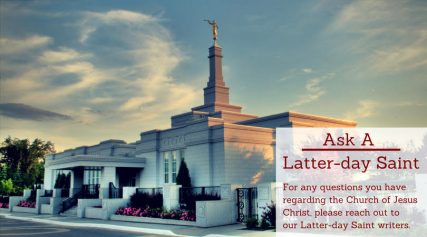Do you have a question about the Church of Jesus Christ of Latter-day Saints? Submit it online or fill out the form below.
By Jeff Borders
Is there any doctrine against a member of The Church of Jesus Christ of Latter-day Saints reading and using the principles of Dianetics: The Modern Science of Mental Health written by L. Ron Hubbard to improve their study ability and mental clarity?

The Doctrine and Covenants, a collection of revelations given to the Prophet Joseph Smith and other Church leaders, states, “Seek ye diligently and teach one another words of wisdom; yea, seek ye out of the best books words of wisdom; seek learning, even by study and also by faith.” (Doctrine and Covenants 88:118)
Also in Doctrine and Covenants 88:79, members are commanded to study a wide range of “things both in heaven and in the earth, and under the earth; things which have been, things which are, things which must shortly come to pass; things which are at home, things which are abroad”
The Prophet Joseph Smith believed that learning and sanctification go together.
Education remains an important priority for the church. In October 2009, President Dieter F. Uchtdorf, then Second Counselor in the First Presidency, said “For members of the church, education is not merely a good idea — it’s a commandment.”
He goes on further, “If formal education is not available, do not allow that to prevent you from acquiring all the knowledge you can. … The best books, in a sense, can become your ‘university’ — a classroom that is always open and admits all who apply.”
The Articles of Faith, a collection of statements about our beliefs as Latter-day Saints, helps us sort through what could be seen as information overload as to the number and variety of things we could read and study. In Articles of Faith 1:13, we affirm, “If there is anything virtuous, lovely, or of good report or praiseworthy, we seek after these things.”
Even the Book of Mormon suggests that other religious texts could have much to offer us, “Wherefore, because that ye have a Bible ye need not suppose that it contains all my words; neither need ye suppose that I have not caused more to be written.” (2 Nephi 29:10–11).
Joseph Smith once said, “We should gather all the good and true principles in the world and treasure them up, be they from Presbyterians, Baptists or anyone else, or we shall not come out true ‘Mormons’”
Following Joseph’s example, Orson F. Whitney, an Apostle of the Church during Joseph’s time said that, “although there is only one way into the kingdom of heaven, there are nevertheless many ways into the human heart. In its mission to promulgate truth, the LDS Church has legitimate use for every avenue to that heart. Poetry, music, art in general, as well as science and philosophy — all these can be utilized as auxiliaries in the carrying on of the Lord’s manifold work.”
To put it another way, the best books, are books that draw us closer to God, inspiring us to be better disciples of Jesus Christ, and to be better people. And the best books don’t have to be perfect or even something you agree with. There is merit to reading things that give us a wide variety of perspective, so that we can understand other viewpoints, and find ways to better connect with others.
So back to the initial questions of could a Latter-day Saint use the theories and practices of Dianetics as taught by The Church of Scientology?
Although it is always bad to answer a question with a question, I’m going to do it anyway: “Does the text draw you closer to God and deepen your relationship with the Savior? Does it make you a better person? Does it help you learn to better connect with others? Or does it drive away the Spirit? Does it bring contention? These are the yard sticks Latter-day Saints are encouraged to use when determining what and how to study. Ultimately it is a matter of individual agency and counseling with God to determine what path you should take in your life.
If everyone who reads and appreciates FāVS, helps fund it, we can provide more content like this. For as little as $5, you can support FāVS – and it only takes a minute. Thank you.
[give_form id=”53376″ show_title=”true” display_style=”button”]








